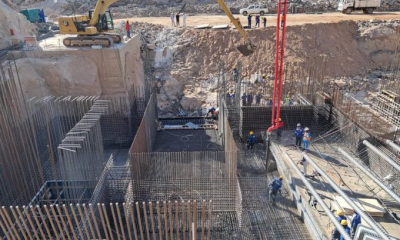Current Affairs
Get to Know the Reduced Fees for Number Plates and Parking in Zimbabwe: Why Now is the Time to Act

Finance Minister Thuli Ncube unveiled a game-changing policy that slashes parking fees, clamping fines, towing charges, and vehicle number plate costs by up to 50%, effective immediately.
As announced by Minister Ncube this week, these reductions aim to ease the financial strain on motorists grappling with rising living costs in Zimbabwe.
For anyone owning or planning to register a vehicle, this is a golden opportunity to save significantly. Here’s why these changes matter and why you should consider securing a new number plate now.
What’s Changing?
The Zimbabwean government has introduced sweeping reductions across key motoring expenses:
– Parking Fees, Clamping Fines, and Towing Charges: Cut by 50% in all towns and cities, including major hubs like Harare and Bulawayo, as well as smaller urban centres.
– Vehicle Number Plates: Previously priced at a steep US$500, number plates now cost just US$50—a massive 90% reduction.
These measures, announced during a Cabinet briefing, reflect the government’s response to long-standing complaints about the prohibitive costs of vehicle registration and parking. The Ministry of Transport and Infrastructural Development, alongside the Zimbabwe National Road Administration (ZINARA) and local authorities, has been tasked with enforcing these changes immediately.
Why the Reductions Matter
1. Affordability for Motorists:
The drastic cut in number plate costs—from US$500 to US$50—makes vehicle registration accessible to a much wider group of Zimbabweans.
Previously, the high cost was a significant barrier, especially for low- and middle-income drivers.
Now, registering a vehicle is far more affordable, allowing more people to comply with legal requirements without breaking the bank.
2. Relief from Parking Costs:
Parking fees, clamping fines, and towing charges have long been a source of frustration for motorists, often seen as disproportionate to incomes. The 50% reduction across all urban centres provides immediate financial relief, making parking easier in cities like Harare and Bulawayo without fear of punitive costs.
3. Response to Public Outcry:
The policy follows widespread complaints about exorbitant motoring fees. By addressing these concerns, the government is responsive to public needs, aiming to support citizens amid economic challenges.
4. Uniform Application:
Unlike past policies that sometimes favoured certain regions, these reductions apply uniformly across Zimbabwe’s urban centres.
Whether you’re in a bustling city or a smaller town, you’ll benefit from the same cost savings.
Why Buy a Number Plate Now?
If you’ve been putting off vehicle registration due to high costs, now is the time to act. Here are compelling reasons to secure a new number plate at the reduced rate:
-Unprecedented Savings: At US$50, number plates are now 90% cheaper than before. This is a rare opportunity to register your vehicle at a fraction of the previous cost.
– Avoid Future Uncertainty: While the government has committed to immediate implementation, there’s no guarantee that these reduced rates will remain in place indefinitely. Acting now ensures you lock in the savings.
– Compliance Made Easy: Registering your vehicle is a legal requirement, and the lower cost removes a major barrier to compliance. Avoid potential fines or penalties by getting your number plate now.
– Support for Economic Relief: By taking advantage of these reductions, you’re aligning with the government’s efforts to make motoring more affordable, contributing to a broader push for economic relief.
Ensuring Compliance and Transparency
Finance Minister Ncube emphasised that the government is committed to transparency in implementing these changes.
The Ministry of Transport and ZINARA are under strict instructions to enforce the new fee structure immediately.
Motorists are encouraged to report any non-compliance at municipal parking facilities or licensing offices to ensure the policy is rolled out effectively.
Take Action Today
The 50% reduction in parking fees and the 90% cut in number plate costs are transformative steps toward making motoring more affordable in Zimbabwe.
Whether you’re a daily commuter, a small business owner with a delivery vehicle, or someone looking to register a new car, these changes directly benefit you.
Don’t miss out on this opportunity to save hundreds of dollars on number plates and reduce your parking expenses.
Head to your nearest licensing office to secure your new number plate for just US$50, and enjoy the reduced parking fees across Zimbabwe’s towns and cities. As Minister Ncube stated, these measures are designed to support citizens facing economic challenges—take advantage of them now and drive with confidence.
Current Affairs
Minister Rwodzi Charts Path as Sector Takes Lead in GDP Growth

Itai Mazire
Tourism and Hospitality Industry Minister Barbara Rwodzi has implored players in the sector to embrace innovation, sustainability, and stronger partnerships to safeguard Zimbabwe’s tourism gains, as the industry now leads national GDP growth ahead of mining and agriculture.
In a speech delivered on her behalf by Tourism Permanent Secretary Dr. Takaruza Munyanyiwa at the Hospitality Association of Zimbabwe (HAZ) Summit and Annual General Meeting in Harare today, Minister Rwodzi said the country stood at a “historic crossroads” following its recent listing by Forbes as the best destination to visit in 2025.
“This is a well-deserved accolade which we should celebrate and sustain going forward. Congratulations, makorokoto, amhlope to the service providers of the tourism and hospitality industry of Zimbabwe.”
The Minister applauded the sector’s resilience in the face of pandemics, economic headwinds, and climate-related shocks, noting that the spirit of Zimbabwean hospitality remains unbroken.
“We have continued to smile, to serve, and to tell our authentic story, hence reaping the rewards now,” she said.
Giving an update on performance, Minister Rwodzi reported that international tourist arrivals grew by 9 percent between January and September 2025 compared to the same period last year, with strong traffic from the Americas, Africa, and Asia.
Domestic travel also surged by 20.9 percent over the same period, while the sector generated approximately USD 922 million in 2025 a 10 percent rise from the USD 839 million recorded last year.
“These are encouraging signs that our recovery is gaining positive traction. But future-proofing requires more than recovery it demands transformation,” she said.
Minister Rwodzi outlined five pillars she said would anchor the transformation of the sector: digitalisation; sustainable and climate-resilient tourism; human capital development; infrastructure and connectivity; and stronger branding and market diversification.
“The future of hospitality is digital,” she said. “We must move from brochures to big data, from paper-based booking to smart platforms.”
She urged operators to embrace online booking systems, virtual reality tourism aids, and other digital tools that enhance visitor experiences.
On sustainability, Minister Rwodzi said protecting Zimbabwe’s natural and cultural heritage was “not an expense it is an investment in the longevity of our industry.”
The Minister stressed the need to invest in human capital, calling on operators to work closely with academia to bridge skills gaps and develop tomorrow’s hospitality innovators. She highlighted the First Lady, Dr. Auxillia Mnangagwa’s gastronomy vision as a key avenue for elevating Zimbabwe’s culinary offerings.
On infrastructural development across the country, she said it remained central to competitiveness: “A tourist’s journey begins long before they reach our front desk — it begins on a road, a runway, or a mobile network.”
Minister Rwodzi reiterated that Government is committed to creating an enabling environment, pointing to the recent reduction of tourism fees by up to 50 percent to lower operating costs.
“Future-proofing cannot be achieved by Government alone,” she said. “The private sector is the engine of creativity, investment, and service excellence.”
Her call for collaboration was anchored on an African proverb which states that, “Tomorrow belongs to the people who prepare for it today.”
The Minister said the role of HAZ remained critical as Zimbabwe eyes increased international tourist inflows.
“The world’s eyes are turning towards Zimbabwe. We have the assets, we have the people, we have the passion so why not?” she said.
“To HAZ, your role has never been more critical. You are the unified voice of the hospitality industry. Your strength lies in your collective action.”
She said the ongoing summit provided a platform to “strategise, innovate, and build consensus” as the sector pushes towards Vision 2030.
“The potential is vast. The time is now. Let us build not just an industry, but a legacy,” said Minister Rwodzi.
Current Affairs
Apostolic Church Founder Paul Mwazha Dies at 107

Zimbabwe and the wider African Christian community are mourning the loss of Bishop Paul Mwazha, the revered founder of the Apostolic Church in Africa, who passed away today at the remarkable age of 107.
Bishop Mwazha, widely regarded as one of the continent’s most influential religious leaders, dedicated his life to the growth and spiritual guidance of his church, which boasts millions of followers across Zimbabwe and beyond. His teachings, rooted in faith, discipline, and community service, have left an enduring legacy that continues to shape generations.
The Apostolic Church in Africa under his leadership became a cornerstone of spiritual life in many communities, providing not only religious guidance but also social support and education initiatives. Church leaders have called for prayers as they prepare for national and regional mourning rituals.
Further details on funeral arrangements and memorial services are expected to be released in the coming days.
Business
Zimbabwe Bets Big on Biotech to Fuel Industrial Revolution


Dr. Eng. Willie Ganda
By Enia Dube
The Minister of Higher and Tertiary Education, Innovation, Science and Technology Development, Hon. Dr Fredrick Shava, has thrown his weight behind biotechnology as a key driver of the country’s industrialisation and modernisation agenda.
Speaking at the National Biotechnology Authority (NBA) Strategic Planning Workshop in Kadoma, Dr Shava urged the Authority to identify biotechnology-led opportunities that can boost national production and accelerate economic growth.
“Biotechnology serves as a key catalyst for NDS2 implementation, advancing inclusive economic growth, job creation, and sustainable industrial development,” Dr Shava said, emphasising the need to integrate biotechnology into national value chains to unlock a biotechnology-driven economy. He added that this would turn innovation into industry, knowledge into enterprise, and science into jobs.
The NBA has made notable progress in establishing a strong regulatory framework, promoting biotechnology research and commercialisation, and raising public awareness about the sector’s potential. The Authority has successfully commercialised products such as Mapfura wine and Cofsol cough syrup, and has several other biotechnology products in the pipeline.
Incoming NBA Board Chairperson, Professor Idah Sithole-Niang, echoed Dr Shava’s sentiments, emphasising that the Authority’s five-year strategic plan must meaningfully contribute to the attainment of Vision 2030. “This event marks a significant milestone in the Authority’s ongoing efforts to enhance the role of biotechnology in Zimbabwe’s socio-economic development,” she said.
The workshop aimed to realign priorities and resources in response to emerging technologies and global biotechnology trends, and develop a strategic roadmap to strengthen biotechnology as a key driver of Zimbabwe’s socio-economic transformation. The rapidly evolving global biotechnology landscape, including advancements in gene editing, bio-manufacturing, and climate-smart innovations, presents both new opportunities and challenges for Zimbabwe.
“We recognise the pressing need for an inclusive and forward-looking strategic plan that can navigate the complexities of the biotechnology landscape,” Professor Sithole-Niang noted. The workshop was attended by researchers, government officials, and NBA staff, who are optimistic about the potential of biotechnology to drive Zimbabwe’s economic transformation and achieve Vision 2030.
-

 Current Affairs1 week ago
Current Affairs1 week agoOperation restore order
-

 Crime and Courts2 months ago
Crime and Courts2 months agoMasasi High School Abuse Scandal Sparks Public Outcry
-

 Crime and Courts2 months ago
Crime and Courts2 months agoKuwadzana Man Jailed for Reckless Driving and Driving Without a Licence
-

 Current Affairs3 months ago
Current Affairs3 months agoMunhumutapa Day: Zimbabwe’s Newest Public Holiday Set for Annual Observance
-

 Current Affairs4 months ago
Current Affairs4 months agoBreaking: ZIMSEC June 2025 Exam Results Now Available Online
-

 Current Affairs1 month ago
Current Affairs1 month agoBREAKING NEWS: ZANU PF Director General Ezekiel Zabanyana Fired
-

 Current Affairs3 months ago
Current Affairs3 months agoGovernment Bans Tinted Car Windows in Nationwide Crime Crackdown
-

 Current Affairs2 months ago
Current Affairs2 months agoExposed: Harare GynecologistChirume Accused of Negligence, Extortion, and Abuse











